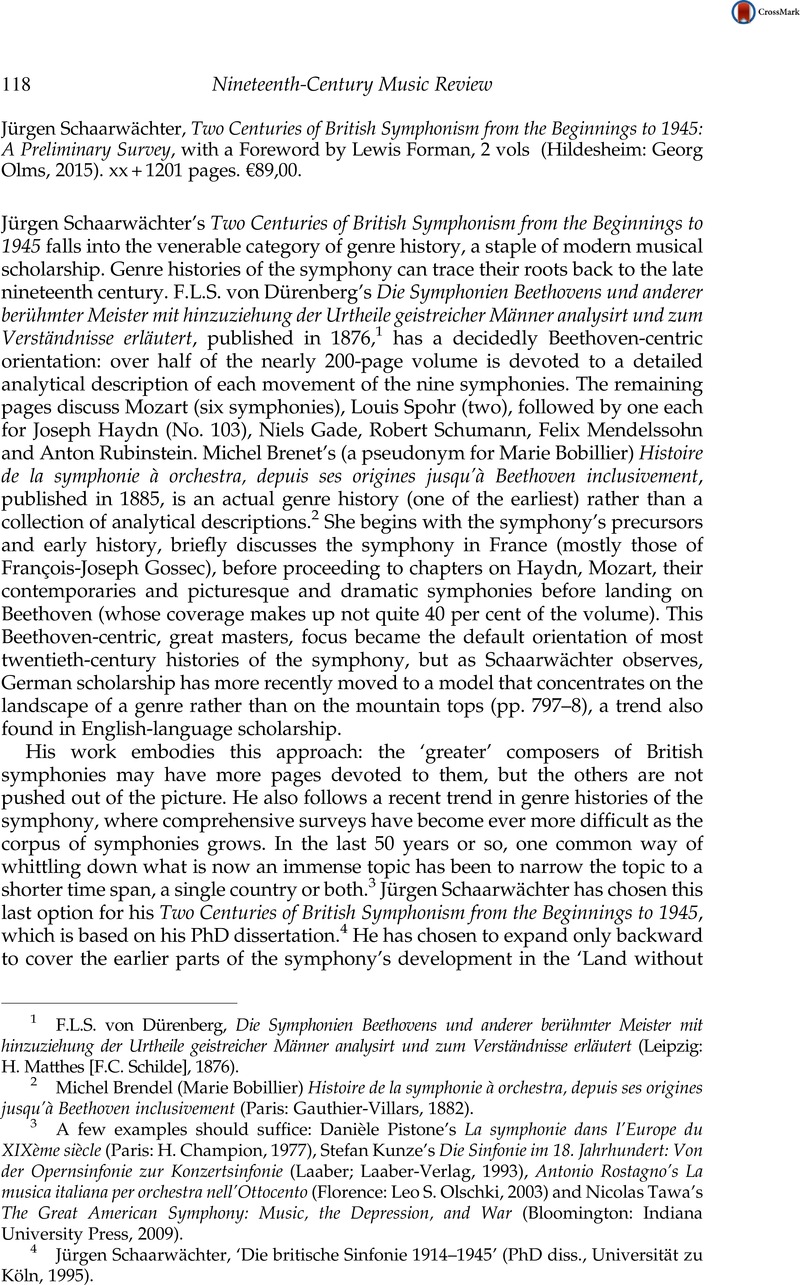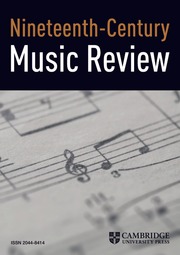No CrossRef data available.
Article contents
Jürgen Schaarwächter, Two Centuries of British Symphonism from the Beginnings to 1945: A Preliminary Survey, with a Foreword by Lewis Forman, 2 vols (Hildesheim: Georg Olms, 2015). xx+1201 pages. €89,00.
Published online by Cambridge University Press: 11 October 2016
Abstract

- Type
- Book Reviews
- Information
- Copyright
- © Cambridge University Press 2016
References
1 von Dürenberg, F.L.S., Die Symphonien Beethovens und anderer berühmter Meister mit hinzuziehung der Urtheile geistreicher Männer analysirt und zum Verständnisse erläutert (Leipzig: H. Matthes [F.C. Schilde], 1876)Google Scholar.
2 Brendel, Michel (Marie Bobillier) Histoire de la symphonie à orchestra, depuis ses origines jusqu’à Beethoven inclusivement (Paris: Gauthier-Villars, 1882)Google Scholar.
3 A few examples should suffice: Pistone’s, Danièle La symphonie dans l’Europe du XIXème siècle (Paris: H. Champion, 1977)Google Scholar, Kunze’s, Stefan Die Sinfonie im 18. Jahrhundert: Von der Opernsinfonie zur Konzertsinfonie (Laaber; Laaber-Verlag, 1993)Google Scholar, Antonio Rostagno’s La musica italiana per orchestra nell’Ottocento (Florence: Leo S. Olschki, 2003) and Tawa’s, Nicolas The Great American Symphony: Music, the Depression, and War (Bloomington: Indiana University Press, 2009)Google Scholar.
4 Schaarwächter, Jürgen, ‘Die britische Sinfonie 1914–1945’ (PhD diss., Universität zu Köln, 1995)Google Scholar.
5 Schmidt, Oscar Adolph Hermann, Das Land ohne Musik: Englische Gesellschaftsprobleme (Munich: Georg Müller, 1914)Google Scholar.
6 It is not clear what the author means here. In the introduction he does indicate that he will not discuss (eighteenth-century) works that have been considered to be symphonies but were not so labelled by the composer. However, the book does not contain an appendix b), only an Appendix II, which is the bibliography and does not include musical sources.
7 Brown, A. Peter, The Symphonic Repertoire, Volume III, Part B (with Brian Hart) (Bloomington: Indiana University Press, 2008): pp. 1–244 Google Scholar; Stewart-MacDonald, Rohan H., ‘Clementi’s Orchestral Works, Their Style, and British Symphonism in the Nineteenth Century: S. Wesley, Critch, Potter, MacFarren and Sterndale Bennett’, Ad Parnassum: A Journal of Eighteenth- and Nineteenth-Century Instrumental Music 5 (October 2007): 7–71 Google Scholar, and ‘The Treatment of the Sonata Principle and the Cultivation of “Cyclic” Processes in the Symphonies of Sir Charles Villiers Stanford, 1852–1924’, Ad Parnassum: A Journal of Eighteenth- and Nineteenth-Century Instrumental Music 6 (October 2008): 69–144; Harper-Scott, J.P.E., ‘“Our True North”: Walton’s First Symphony, Sibelianism, and the Nationalization of Modernism in England’, Music & Letters 89 (November 2008): 562–589 CrossRefGoogle Scholar, and ‘Vaughan Williams’s Antic Symphony’, in British Music and Modernism (1895–1960), ed. Matthew Riley (Farnham: Ashgate, 2010): 175–96; and McVeigh, Simon, ‘The Symphony in Britain’, in The Eighteenth-Century Symphony, ed. Mary Sue Morrow and Bathia Churgin (Bloomington: Indiana University Press, 2012): 629–661 Google Scholar.



